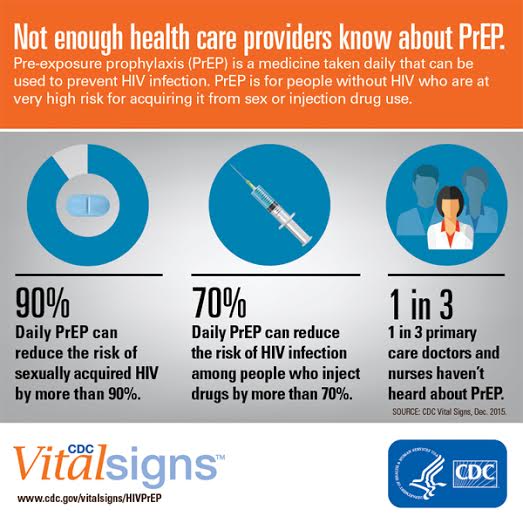
The Centers for Disease Control and Prevention (CDC) publishes guidelines and updates for preventing HIV infection. They call it Pre-Exposure Prophylaxis or PrEP. People at risk for HIV infection can be “PrEP-ared” to avoid infection.
FDA-approved medications for PrEP
The FDA has approved three medications for PrEP, two taken orally and one via injection:
- Truvada
- Descovy
Both of these are single tablets taken orally once a day. They are combinations of the two drugs emtricitabine and tenofovir. Both contain 200mg emtricitrabine; Truvada contains 300 mg. tenofovir disoproxil; Descovy contains 25 mg tenofoviralafenamide. Both forms of tenofovir have demonstrated similar efficacy in clinical trials. Truvada is recommended for all adults and adolescents weighing at least 77 pounds who are at risk through sex or injection drug use. Descovy is not recommended for people assigned female at birth who could get HIV through receptive vaginal sex; it has not yet been studied for HIV prevention in that population.
- Apretude (cabotegravir) – an injection given in the buttocks every 2 months after 2 initial doses 1 month apart; recommended for all people at risk through sex.
They caution that these drugs do not cancel the need for other preventive measures. They “should be considered part of a comprehensive prevention plan that includes a discussion about adherence to PrEP, condom use to prevent getting other sexually transmitted infections (STIs), and other risk-reduction methods”.
Their website estimates the effectiveness of PrEP as 99% for sexual transmission and 74-84% for injection drug users.
The US Preventive Services Task Force did a systematic review of the evidence as of 2019. Their report was published in The Journal of the American Medical Association (JAMA). They found a relative risk of HIV infection of 46% in patients using PrEP compared to those using placebo, an absolute risk reduction of 2%. Efficacy was highly dependent on adherence, with good adherence decreasing the relative risk to 27%. There were more adverse renal and gastrointestinal adverse effects with PrEP than with placebo, but most adverse effects were mild and reversible.
Advantages of Injectable
Since the efficacy of oral PrEP is so dependent on adherence, an injection might improve efficacy by eliminating the need to remember to take a daily pill. But it would be rejected by those who hate needles. Cost is not an advantage. Truvada costs $2,000 a month; Apretude costs $3,700. But cost may not be an important consideration for patients, since several assistance plans are available that may reduce their cost to $0.
It will be interesting to see how usage compares. It might be difficult to remember when the 2 months is up, but that can be addressed with automatic reminder systems.
Apretude efficacy vs Truvada
The pill and the injection have been compared in two randomized double-blind trials. Apretude was more effective, but the numbers varied. Adverse effects were more common with the injection. Apretude carries a boxed warning to the provider, who must verify that the patient is HIV negative before each injection. There are also warnings and precautions regarding hypersensitivity reactions, liver damage, and depression.
Conclusion: Many new HIV infections could be prevented
It’s encouraging that many (maybe most) new HIV infections could be prevented with PrEP. New HIV infections continue to be diagnosed, with racial inequities. The number declined the most among White gay and bisexual men. PrEP is not reaching everyone who could benefit. In 2017, 27% of Black and 31% of Hispanic/Latino gay and bisexual men were using pre-exposure prophylaxis (PrEP) to prevent HIV, compared with 42% of White gay and bisexual men. It’s important to make sure all those at risk know about PrEP and that everyone who requests it is given it. Science has made great strides, but we can do better.

